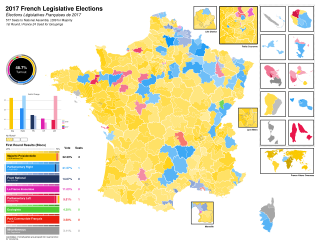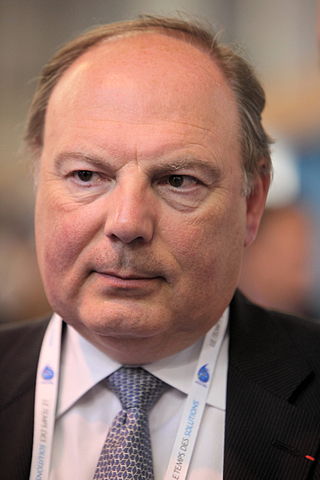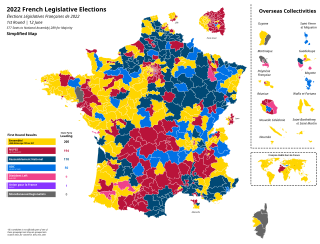
François René Jean Lucien Bayrou is a French politician who has presided over the Democratic Movement (MoDem) since he founded it in 2007. A centrist, he was a candidate in the 2002, 2007 and 2012 presidential elections. He has also presided over the European Democratic Party (EDP) since 2004.

Debout la France is a French political party founded by Nicolas Dupont-Aignan in 1999 under the name Debout la République as the "genuine Gaullist" branch of the Rally for the Republic. It was relaunched again in 2000 and 2002 and held its inaugural congress as an autonomous party in 2008. At the 2014 congress, its name was changed to Debout la France.
Miscellaneous right in France refers to centre-right or right-wing candidates who are not members of any large party. This can include members of small right-wing parties, dissidents expelled from their party for running against their party's candidate, or candidates who were never formal members of a party. Numerous divers droite candidates are elected at a local level, but also at a national level.

Françoise Férat is a French politician and a member of the Senate of France. She represents the Marne department and is a member of the Centrist Alliance.

Jean-Luc Mélenchon is a French politician who was a member of the National Assembly for the 4th constituency of Bouches-du-Rhône from 2017 to 2022. He led the La France Insoumise group in the National Assembly from 2017 to 2021. Mélenchon has run three times in elections for president of France; in 2012 and 2017, and a strong third in the 2022 election, where he narrowly missed continuing on to the second round in France's two-round voting system.

Damien Abad is a French politician who briefly served as Minister of Solidarity in the government of Prime Minister Élisabeth Borne in 2022.

The Centrist Union is a centrist parliamentary group in the Senate uniting members of the Union of Democrats and Independents (UDI) and Democratic Movement (MoDem), as well as the Centrist Alliance (AC), a former component of the UDI. The group was historically associated with the Popular Republican Movement (MRP) and later the Democratic Centre (CD), Centre of Social Democrats (CDS), and Union for French Democracy (UDF). Most recently, from 2012 to 2017, it was known as the Union of Democrats and Independents – UC group.

The Republicans is a liberal-conservative political party in France, largely inspired by the tradition of Gaullism. The party was formed on 30 May 2015 as the re-incorporation of the Union for a Popular Movement (UMP), which had been established in 2002 under the leadership of then President of France Jacques Chirac.

Legislative elections were held in France on 11 and 18 June 2017 to elect the 577 members of the 15th National Assembly of the Fifth Republic. They followed the two-round presidential election won by Emmanuel Macron. The centrist party he founded in 2016, La République En Marche! (LREM), led an alliance with the centrist Democratic Movement (MoDem); together, the two parties won 350 of the 577 seats—a substantial majority—in the National Assembly, including an outright majority of 308 seats for LREM. The Socialist Party (PS) was reduced to 30 seats and the Republicans (LR) reduced to 112 seats, and both parties' allies also suffered from a marked drop in support; these were the lowest-ever scores for the centre-left and centre-right in the legislative elections. The movement founded by Jean-Luc Mélenchon, la France Insoumise (FI), secured 17 seats, enough for a group in the National Assembly. Among other major parties, the French Communist Party (PCF) secured ten and the National Front (FN) obtained eight seats. Both rounds of the legislative election were marked by record low turnout.

"Bastir!", originally the "Manifeste Occitaniste", now "Bastir Occitanie", is a pan-Occitanist movement mainly involved in French municipal elections of 2014, in French departmental elections of 2015, in French legislative elections of 2017 and 2022, and in French regional elections of 2021.

Renaissance (RE) is a liberal and centrist political party in France. The party was originally known as En Marche ! and later La République En Marche ! before adopting its current name in September 2022.

Christophe Castaner is a French politician who served as Minister of the Interior from 16 October 2018 to 6 July 2020 under President Emmanuel Macron. He had been elected in 2017 for a three-year term as chairman of the La République En Marche! party with Macron's support. Castaner was Government Spokesperson under Prime Minister Édouard Philippe in 2017 and Secretary of State for Relations with Parliament from 2017 to 2018. He was also Macron's 2017 presidential campaign spokesman.

Olivier Faure is a French politician who has served as the First Secretary of the Socialist Party since 2018 and Member of the National Assembly for Seine-et-Marne's 11th constituency since 2012. He was elected to the post of first secretary in the party's Aubervilliers Congress and re-elected in the 2021 Villeurbanne Congress. Faure was previously the head of the New Left group, the parliamentary group formed around the PS in the National Assembly, from December 2016 to April 2018.

Senate Republicans, formerly the Union for a Popular Movement, is a parliamentary group in the French Senate including representatives of The Republicans (LR), formerly the Union for a Popular Movement.

Hervé Marseille is a French politician who has presided over the Centrist Union group in the Senate since 2017 and over the Union of Democrats and Independents party since 2022. He has represented the Hauts-de-Seine department in the Senate since 2011.

Legislative elections were held in France on 12 and 19 June 2022 to elect the 577 members of the 16th National Assembly of the Fifth Republic. The elections took place following the 2022 French presidential election, which was held in April 2022. They have been described as the most indecisive legislative elections since the establishment of the five-year presidential term in 2000 and subsequent change of the electoral calendar in 2002. The governing Ensemble coalition remained the largest bloc in the National Assembly but substantially lost its ruling majority, resulting in the formation of France's first minority government since 1993.

Together is a liberal political coalition in France. Formed in November 2021 as Ensemble Citoyens, it includes Renaissance, Democratic Movement (MoDem), Horizons, En commun, and the Progressive Federation. The coalition included the parties Agir and Territories of Progress (TDP) until they were merged into the rebranded Renaissance. Ensemble has mainly been described as being centrist, and sometimes as centre-right on the political spectrum.

Marie-Laure Phinéra-Horth is a French politician, who was the first woman from French Guiana to be appointed to the French Senate in 2020. Prior to her role as a senator, she was mayor of Cayenne from 2010.

The Union of the Right and Centre is a term used in France to designate an electoral alliance between the parties of the right and of the centre.
Sovereign Right is a political nuance created by the French Ministry of the Interior on the occasion of the regional and departmental elections of 2021.

















